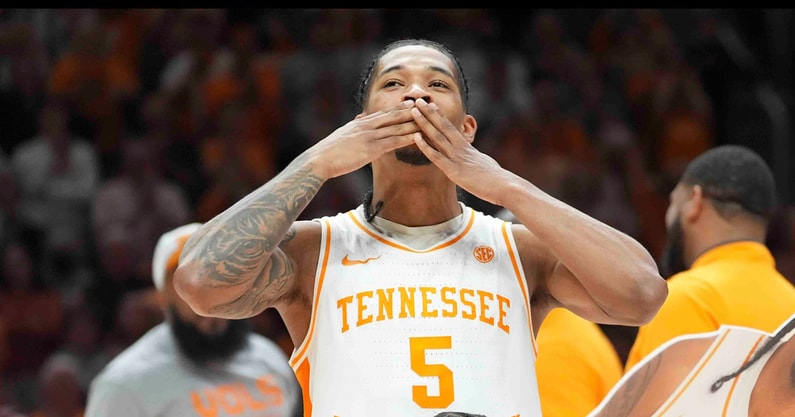
Zakai Zeigler, a beloved and accomplished figure in Tennessee Volunteers basketball history, has launched a legal battle against the NCAA in a bold and unprecedented attempt to gain eligibility for an additional year of college basketball. Zeigler, who played in 138 career games for the Vols from 2021 to 2025, filed a lawsuit this week in federal court, arguing that unique and extenuating circumstances disrupted the natural course of his collegiate athletic career and merit a special exemption from the NCAA’s standard eligibility rules.
Zeigler, a fan favorite known for his gritty playmaking, unshakable composure, and leadership on and off the court, was a key contributor during one of the most successful stretches in Tennessee basketball history. Throughout his career, he was recognized not only for his production—averaging over 10 points and 5 assists per game—but also for his resilience, particularly following a season-ending ACL injury during his sophomore campaign in 2023.
It is that injury, along with other factors cited in the lawsuit, that form the basis of Zeigler’s legal challenge. According to court documents, Zeigler’s legal team is arguing that his 2022-2023 season, in which he suffered the injury late in the year, should not count against his eligibility clock. The NCAA had previously denied a waiver request, citing that he had already participated in the majority of the season and that medical redshirt rules did not apply.
However, Zeigler’s attorneys contend that the NCAA’s decision fails to account for the broader context of his injury, including the timing, long-term recovery impact, and its effects on his development and professional trajectory. The suit also brings attention to inconsistencies in how the NCAA has granted waivers in other cases, asserting that the organization has demonstrated a pattern of arbitrary or capricious decision-making that violates student-athletes’ rights under the equal protection clause.
In addition to the ACL injury, the lawsuit mentions personal hardships Zeigler endured during his time in Knoxville. He famously played through emotional challenges related to the devastating house fire that displaced his family in 2022, an event that rallied national attention and led to widespread support from the Tennessee community and college basketball fans across the country. His supporters argue that Zeigler’s dedication to his team and academic obligations during that time underscore the unique burden he carried.
The NCAA has not yet issued an official response to the lawsuit, though a spokesperson said the organization is “reviewing the filing and remains committed to fair and consistent eligibility determinations.” Legal experts note that this case could have wide-ranging implications, potentially setting a new precedent for how waivers and medical hardships are evaluated, especially in a post-COVID era that has already complicated the framework of college eligibility.
From a basketball perspective, Zeigler’s return to the court would be a major storyline in the 2025-2026 season. The point guard had shown flashes of pro-level potential but was considered a fringe NBA Draft prospect due to his size and injury history. A final college season could provide him the platform to prove himself to scouts and solidify his legacy in NCAA basketball.
The University of Tennessee has not been named as a party in the lawsuit but released a statement expressing continued support for Zeigler, highlighting his contributions to the program and community. “Zakai has been a cornerstone of our basketball family. We respect his decision and admire his determination to continue his journey,” the statement read.
As the legal proceedings unfold, Zeigler remains in Knoxville, training with personal coaches and remaining close to the Tennessee program. He has kept a low profile publicly but released a brief statement on social media, thanking fans for their support and expressing hope that he would be able to wear the Vols jersey once more.
This case has sparked national debate among fans, media, and former players about athlete rights, NCAA governance, and the evolving nature of college sports in an era defined by NIL deals, transfer portal flexibility, and increasing legal challenges to institutional authority. Whether Zeigler’s lawsuit succeeds or not, it represents a landmark moment in the ongoing transformation of collegiate athletics—and for Zeigler, one last stand in a career defined by determination, heart, and the will to overcome.






